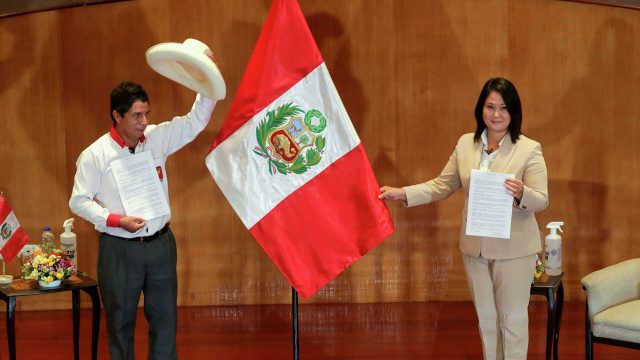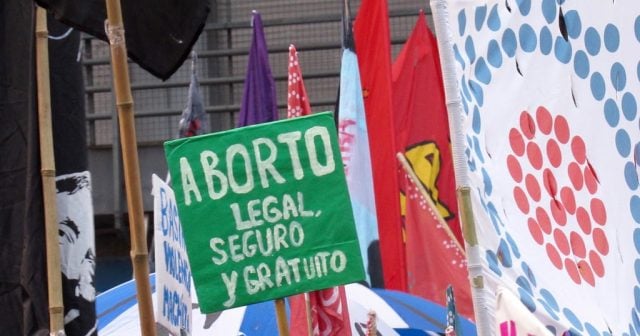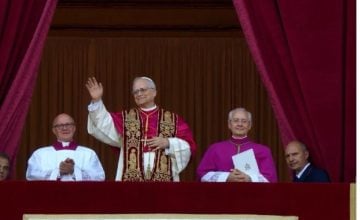The presidential candidate of Fuerza Popular, the right-wing Keiko Fujimori, accused Peru Libre on Wednesday night of implementing systematic actions to break the popular will, a statement that was immediately rejected by the electoral authorities.
Through the annulment actions at 802 polling stations nationwide for alleged irregularities and the monitoring of 1,200 electoral records observed, Fujimori assured that there were some 500,000 votes at stake that should be analyzed by the National Elections Jury.
«These actions demonstrate the systematic intention of Peru Libre to break the popular will», said Fujimori when the National Office of Electoral Processes (ONPE) reported on the 99.041% of the tally sheets, which gave the leftist candidate from Peru Libre, Pedro Castillo,a partial victory by an advantage of more than 73,000 votes.
The National Elections Jury (JNE) expressed that Fujimori’s request was extraordinary for the Peruvian electoral system, said the journalist José Beltrán in a report for RT.
«The Peruvian electoral system is thinking about things of very little dimension in relation to the appeals (…) What is happening now is extraordinary», said the president of the JNE, Jorge Luis Salas, in an interview with RPP Noticias.
The process establishes that the Special Electoral Jury has three days to call a hearing and resolve requests for invalidity. In the following three days, the political parties can file appeals. And subsequently, the JNE has another three days to issue a decision.
«If 10 or 15 causes were raised, there would be no problem in solving them promptly. But if it were to rise in considerable numbers, I suppose the three days could be a bit tight”, said Salas.
However, the appeals for annulment announced by Fujimori represent a considerably high number. Salas recalled that during the 2011 general elections there were six nullities. While in the 2016 elections, the applications increased to a total of 26. «No one would want three-minute resolutions with the material impossibility of analysis», explained Salas.
Electoral fraud in Peru?
Peruvian political scientist Martín Tanaka also dismissed Fujimori’s fraud thesis. On his Twitter account, Tanaka addressed the different scenarios under which, hypothetically, the fraud could have been committed.
In the first scenario, the professor from the Pontifical Catholic University of Peru (PUCP) ruled out the possibility of a massive presence of activists and representatives of Peru Libre who would have replaced board members who arrived late.
Still, he said the political party (Peru Libre) accredited few representatives. In addition, Tanaka clarified that the tally sheets with challenged votes were about 470, and in each of them «only some votes are challenged, no more».
«If the ‘fraud’ does not go out there, there would have to be a collusion among the table members ‘taking advantage’ of the absence of opponents or observers; theoretically, it can happen, but to limit that from occurring, the table members and their substitutes are chosen by lottery. And once they fill out the tally sheets, the votes are destroyed and the discussion ends there», said the political scientist about the second hypothesis.
Regarding the 86,480 records processed by the National Office of Electoral Processes, Tanaka stated that it is usual to find irregularities that are resolved at the moment. «The ONPE found about 1,300, which it has been solving, now there are about 442. Could there be any machinery behind the tally sheets with problems? Very unlikely”, he pointed out.
Instead, Tanaka stated that it would be «more credible» for the tally sheets to have inconsistencies in the information (poorly signed or filled out), but it would be the effect of having board members chosen by lottery and participating in «a long and tense scrutiny», who end up filling out these documents after a twelve-hour shift. «The grounds for nullity are very specific and the requests of Fuerza Popular do not seem to correspond to them», said Tanaka.
In this sense, the political scientist affirmed that the Peruvian electoral system «has many guarantees against the possibility of fraud» and that it contemplates the right to request the nullity of acts. However, «a democratic organization does not abuse that right», concluded Tanaka on the appeals announced by Fujimori and Fuerza Popular.
Congratulations to Pedro Castillo
During Wednesday’s recount, Human Rights Watch called for «serious evidence» to be attached to any allegation of fraud.
“In Peru, as in any democracy, the electoral results must be respected. Any allegation of fraud must be accompanied by serious evidence», wrote Human Rights Watch Americas director José Miguel Vivanco on his Twitter account.
With 99.56% of the tally sheets, Castillo obtained 50.172% of the votes, while his opponent Keiko Fujimori reached 49.828% of the votes. The difference favors the candidate from Peru Libre, by 60,398 votes.
Pending the closing of the count, the president of Argentina, Alberto Fernández, congratulated Castillo «for his eventual victory in the ballot for the presidential elections in Peru».
Messages of congratulations also came from the former president of Bolivia, Evo Morales, and from Luiz Inácio Lula da Silva, frm Brasil.











